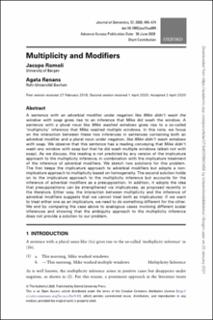Multiplicity and Modifiers
Journal article, Peer reviewed
Published version

Åpne
Permanent lenke
https://hdl.handle.net/11250/2759151Utgivelsesdato
2020Metadata
Vis full innførselSamlinger
Sammendrag
A sentence with an adverbial modifier under negation like Mike didn’t wash the window with soap gives rise to an inference that Mike did wash the window. A sentence with a plural noun like Mike washed windows gives rise to a so-called ‘multiplicity’ inference that Mike washed multiple windows. In this note, we focus on the interaction between these two inferences in sentences containing both an adverbial modifier and a plural noun under negation, like Mike didn’t wash windows with soap. We observe that this sentence has a reading conveying that Mike didn’t wash any window with soap but that he did wash multiple windows (albeit not with soap). As we discuss, this reading is not predicted by any version of the implicature approach to the multiplicity inference, in combination with the implicature treatment of the inference of adverbial modifiers. We sketch two solutions for this problem. The first keeps the implicature approach to adverbial modifiers but adopts a non-implicature approach to multiplicity based on homogeneity. The second solution holds on to the implicature approach to the multiplicity inference but accounts for the inference of adverbial modifiers as a presupposition. In addition, it adopts the idea that presuppositions can be strengthened via implicatures, as proposed recently in the literature. Either way, the interaction between multiplicity and the inference of adverbial modifiers suggests that we cannot treat both as implicatures: if we want to treat either one as an implicature, we need to do something different for the other. We end by comparing the case above to analogous cases involving different scalar inferences and showing that the ambiguity approach to the multiplicity inference does not provide a solution to our problem.
